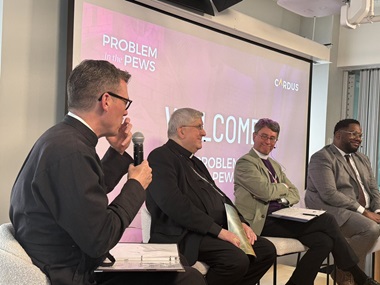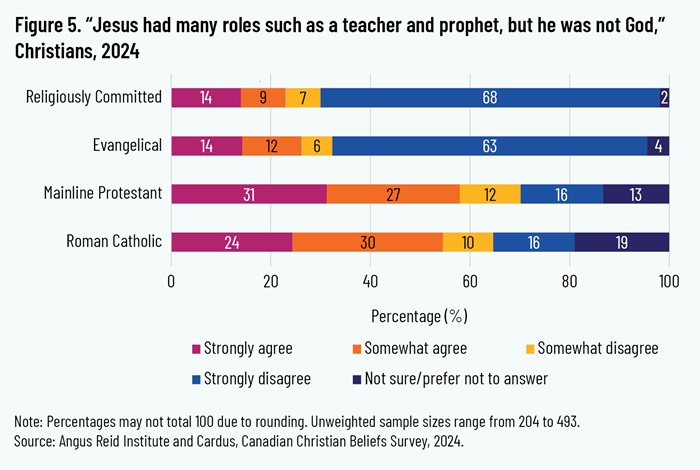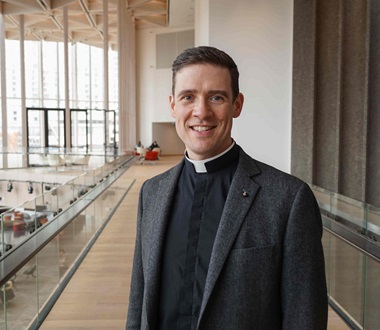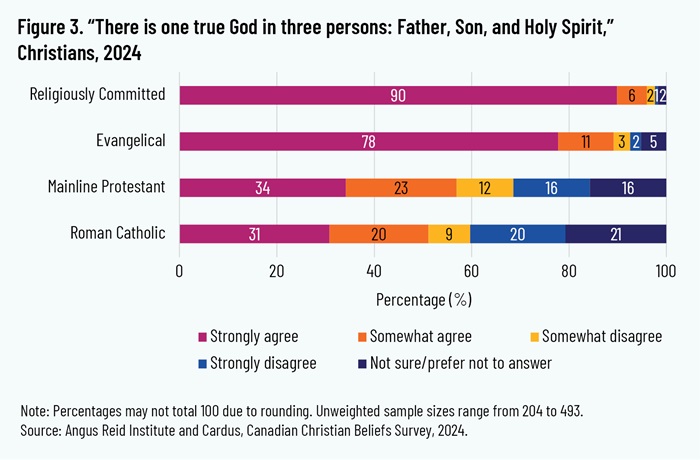
One of the two ‘Problem in the Pews’ panel, featuring Fr. Deacon Andrew Bennett (left), His Eminence Cardinal Collins, Bishop Stephen Andrews and Pastor Joel St. John.
Following is a release from Cardus describing a report they posted May 7; it was accompanied by a ‘Problem in the Pews’ assessment in Ottawa.
Canadian Christians’ beliefs don’t necessarily match what their churches teach. That’s one of the key findings in a major new study by Cardus, Still Christian(?): What Canadian Christians Actually Believe.
The survey of Canadian Christians found some significant inconsistencies between personal beliefs and historic church teachings:
- When asked whether “There is one true God in three persons: Father, Son and Holy Spirit,” 89% of Evangelicals agreed, 51% of Catholics agreed, and 57% of mainline Protestants agreed.
- Belief in the resurrection of Jesus Christ as a historical event is held by 81% of Evangelicals, 48% of Catholics and 55% of mainline Protestants.
- Belief that Jesus Christ was not God ranges from 26% of Evangelicals, to 54% of Catholics, to 58% of mainline Protestants.
- When asked whether all religions are equally true, 20% of Evangelicals agreed, compared to 54% of Catholics and 57% of mainline Protestants.
- 65% of Evangelicals disagreed that “Christian moral teachings should evolve with changes in society’s attitudes,” whereas 72% of Catholics and 61% of mainline Protestants agreed.

]The survey also placed respondents into one of four categories along a continuum, termed Non-religious, Spiritually Uncertain, Privately Faithful, and Religiously Committed (ie, along with identifying them as Evangelical, Mainline Protestant or Roman Catholic).]
Interpreting survey results
“You could say there’s a real problem in the pews,” says Rev. Dr. Bennett, Cardus Faith Communities Program Director:

Andrew Bennett wrote the ‘Still Christian(?): What Canadian Christians Actually Believe’ report and hosted ‘Problem in the Pews.’
While Evangelicals largely mirror their denomination’s doctrines, there is still some level of incoherence there.
Catholics often diverge, presenting both a challenge and an opportunity for the Church to reconcile its members with its teachings.
Meanwhile, the diverse landscape of Mainline Protestant beliefs is complicated, but hints at deep fractures within those denominations.
Still Christian(?) also found that younger Canadian Christians display a stronger commitment to the teachings and practices of their faith compared to older generations.
“In an era where Christianity is no longer a given in society, young Christians may be making deliberate, counter-cultural choices to adhere to the beliefs and devotional life of historical Christianity,” says Rev. Dr. Bennett.
Background to survey
Cardus conducted a survey of Canadian Christians in partnership with the Angus Reid Institute and with support from the Canadian Bible Society in February 2024. This allowed Rev. Dr. Andrew Bennett to compare and contrast respondents’ beliefs with teachings that have historically been affirmed within Christianity and that continue to be officially endorsed by some Christian churches.
Still Christian(?): What Canadian Christians Actually Believe is freely available online.
To learn more about Cardus’s previous surveys with the Angus Reid Institute, visit the Cardus home page. Cardus has also worked previously with the Canadian Bible Society to study Canadian Christians’ engagement with and knowledge of their own scriptures.
******************
Two panels engaged in Problem in the Pews, which was billed as – and was – “an enlightening discussion on the internal state of the Canadian church and also on how Canadian Christians engage with the broader culture.”
Panel 1
- The Church and Society: Looking Outward – moderated by Ray Pennings (Executive Vice President and Co-founder of Cardus)
- Mr. Rick Hiemstra, Evangelical Fellowship of Canada
- Dr. Kevin Flatt, Redeemer University (Reformed Christian)
- Rev. Dr. Marilyn Draper, Tyndale University (Evangelical)
Panel 2
- Christian Leaders: Inner Challenges and Opportunities – moderated by Fr Deacon Andrew Bennett
- His Eminence Thomas Cardinal Collins, Roman Catholic Archbishop Emeritus of Toronto
- Bishop Stephen Andrews, Wycliffe College (Anglican)
- Pastor Joël St. John, Liberty Church (Evangelical)

You can see a series of brief videos from the Cardus ‘Problem in the Pews’ gathering May 7 on X/Twitter. Here are a few comments that stood out for me:
- Andrew Bennett (with exemplary modesty): “Speaking as someone from the Catholic tradition, we as Catholics sometimes like to think that, well, you know, we’re a little bit better in terms of our beliefs than the Protestants. This will expose that as being a myth. People that tick the box as Roman Catholics look very much like mainline Protestants.”
- Andrew Bennett: Regarding the Eucharist or Lord’s Supper or Holy Communion: “Amongst religiously committed Christians, just over 80% believe that it only symbolizes the body and blood of Christ – which would be what many different Protestants and evangelical traditions hold . . . but then we also have significant numbers of Roman Catholics holding to this view. In fact, close to 70% of Roman Catholics agree with this statement, which effectively denies the Real Presence in the Eucharist, which is a core teaching, not only in the Catholic church, but certain of the Orthodox churches.
- Kevin Flatt said the patterns exemplified by the three main bodies of Christians – Catholic, Mainline and Evangelical – “have been pretty consistent for several decades [since the 1960s]. . . . I’m a bit surprised at the kind of robustness in the Evangelical subset, the robustness of continuing commitment to certain orthodox Christian teachings . . .”
- Rick Hiemstra: “If you’re not in a church, if you don’t have first-hand knowledge of what Christians do behind those doors on a Sunday, where are you getting your data on Christianity? You’re either getting it from social media or on Netflix, where the Christians are always deviants. They’re the ones that kill people or are sexually perverse in some kind of way. So if we talk about a brand, then I think our brand is being created in other places and other spaces other than the church.”
- Thomas Cardinal Collins: “In trying to kind of dialogue with the world – in the way we try to dialogue with the world – the world is colonizing us. . . . We need to know who we are.”
